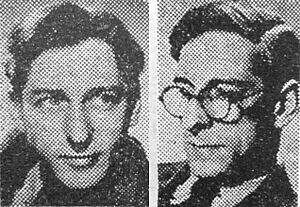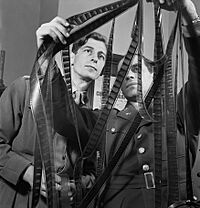Boulting brothers facts for kids
John Edward Boulting (born December 21, 1913 – died June 17, 1985) and Roy Alfred Clarence Boulting (born December 21, 1913 – died November 5, 2001) were English filmmakers. They were identical twins and became famous for their funny movies that made fun of different parts of British life in the 1950s and 1960s. They often made their films through their own company, Charter Film Productions, which they started in 1937.
Quick facts for kids
John and Roy Boulting
|
|
|---|---|

Roy (left) and John (right) Boulting, in 1952
|
|
| Born |
Joseph Edward John Boulting
21 December 1913 Alfred Fitzroy Clarence Boulting 21 December 1913 Bray, Berkshire, England
|
| Died | John: 17 June 1985 (aged 71) Sunningdale, Berkshire, England Roy: 5 November 2001 (aged 87) Eynsham, Oxfordshire, England |
| Other names | Collectively: Boulting brothers
John: John Edward Boulting Roy: "Roy" Alfred Clarence Boulting |
| Occupation | Film producers and directors |
| Spouse(s) | John:
Veronica Davidson
(m. 1938, divorced)Jacqueline Duncan
(m. 1952; div. 1966)Ann Marion
(m. 1972, divorced)Anne Josephine
(m. 1977)Roy: Angela Warnock
(m. 1936; div. 1941)Jean Capon
(m. 1942; div. 1951)Enid Munnik
(m. 1951; div. 1964)Sandra Spencer
(m. 1978; div. 1984) |
| Partner(s) | Roy: Victoria Vaughan (mid-1960s) |
| Children | John: 6
Roy: 7, including Crispian Mills |
Contents
Early Life and Beginnings in Film
The Boulting brothers, John and Roy, were born in Bray, England, on December 21, 1913. John was born just half an hour before Roy. Their older brother, Sydney, became an actor and stage producer known as Peter Cotes. He was the first director of the famous play The Mousetrap.
Both twins went to Reading School. There, they started a film club, showing how much they loved movies from a young age. While still in school, they even appeared as extras in the 1931 film Tell England.
After school, Roy traveled to Canada and worked for a while. He later worked his way back to England on a ship. He then got into film production, first in sales, then as an assistant director. The money he earned helped fund their very first short film, Ripe Earth (1938).
John joined the Spanish Medical Aid Committee in 1937, helping as an ambulance driver during the Spanish Civil War. During World War II, both brothers served in the military and made films. John was an officer in the RAF Film Production Unit. Roy was a captain in the British Army and worked with the Army Film Unit, making several short documentaries.
Filmmaking Careers

The Boulting brothers often worked as a team. One would produce the film, and the other would direct it. But all their movies were known as "Boulting Brothers films." They believed that movies, even comedies, should show the real world.
Starting Charter Film Productions
In 1937, John and Roy started their own company called Charter Film Productions. They made several short films, like The Landlady (1937) and Consider Your Verdict (1938). These films caught the attention of critics and audiences. They also made some quick, low-budget films such as Trunk Crime (1939).
Early Feature Films
The brothers wanted to speak out against the Nazis. So, they made Pastor Hall (1940), a film about a German preacher who stood up to them. Roy directed this film, and John produced it. The movie was well-received by critics and the public.
They then made Thunder Rock (1942), a powerful film about not isolating oneself from the world. It was known for its creative camera work and a dramatic lighthouse setting.
Making Films During World War II
During the war, Roy joined the Army Film Unit. He was in charge of Desert Victory, a documentary that won an Academy Award in 1944. He also worked on other war documentaries like Tunisian Victory (1944). John, with the RAF Film Unit, made Journey Together in 1945. This film was a dramatized documentary about the training of a bomber crew, starring Richard Attenborough.
Popular Post-War Movies
After the war, the Boultings made the drama Fame Is the Spur (1947). A bigger hit was Brighton Rock (1947), a crime film starring Richard Attenborough as a gangster. Another popular film was The Guinea Pig (1948), where Attenborough played a working-class boy sent to a fancy public school.
The brothers also co-directed the thriller Seven Days to Noon (1950), which won an Oscar for Best Story. John directed The Magic Box (1951), a film about the inventor of cinema, William Friese-Greene. This movie had many famous actors in small roles.
Hollywood Connections
Roy directed Sailor of the King (1953), a naval film for a big Hollywood studio, 20th Century Fox. They also made Seagulls Over Sorrento (1954) with Hollywood star Gene Kelly. The brothers worked together on the comedy Josephine and Men (1955). Roy also directed the action film Run for the Sun (1956) with Hollywood actors.
Famous Satirical Comedies
In the mid-1950s, the Boulting brothers became known for their funny films that gently made fun of British institutions.
- It started with John's Private's Progress (1956), a comedy about army life. It starred Richard Attenborough and Terry-Thomas and was very successful.
- They followed up with Lucky Jim (1957), which poked fun at university life.
- Brothers in Law (1957) made fun of the legal profession.
- Carlton-Browne of the F.O. (1959) was a comedy about diplomacy.
- One of their biggest hits was I'm All Right Jack (1959), a sequel to Private's Progress. This film made fun of trade unions and business leaders. It featured a memorable performance by Peter Sellers as a union foreman. It was the most popular film in Britain in 1959.
- Heavens Above! (1963) was a comedy that looked at religion in Britain, starring Peter Sellers.
Working with Hayley Mills
The Boultings directed and produced The Family Way (1966), a comedy starring John Mills and his teenage daughter, Hayley Mills. Roy Boulting and Hayley Mills later married in 1971.
Roy wrote and directed Twisted Nerve (1968), a thriller starring Hayley Mills. The brothers had another huge hit with There's a Girl in My Soup (1970), starring Peter Sellers and Goldie Hawn. Roy also directed Hayley Mills in Mr. Forbush and the Penguins (1971).
Later Career and Legacy
Roy directed The Last Word (1979) in the US. When John died in 1985, Roy stopped making films. His last directing job was an episode of the TV series Miss Marple in 1985.
The Boulting Brothers' films are seen as a good way to understand how British society changed over time.
Personal Lives and Families
John Boulting was married four times and had six children. His sons Norris and Nicholas were from his first marriage. Norris is the father of the TV presenter and journalist Ned Boulting. John's second marriage gave him three daughters: Jody, Emma, and Lucy. Lucy Boulting Hill became a successful casting director. John's grandson, Jordan Stephens (Emma's son), is part of the British hip hop group Rizzle Kicks.
Roy Boulting was married five times and had seven sons. With his second wife, Jean Capon, he had sons Jonathan and Laurence. Laurence became a successful film producer and director himself. With his third wife, Enid Munnik, he had three children: Fitzroy and identical twins Edmund and Rupert.
Roy later had a son with Victoria Vaughan. In 1971, Roy married Hayley Mills, whom he met while making The Family Way. Their son is the musician and filmmaker Crispian Mills. Roy and Hayley divorced in 1977. His last marriage was to actress Sandra Payne.
Deaths
John Boulting died on June 17, 1985, at his home in Sunningdale, Berkshire. Roy Boulting passed away 16 years later on November 5, 2001, in Oxford. Both brothers died of cancer.
Filmography
Films directed jointly
- Seven Days to Noon (1950)
- Suspect / The Risk (1960)
- Heavens Above! (1963)
Films directed by John
- Journey Together (1945)
- Brighton Rock (1948)
- The Magic Box (1951)
- Private's Progress (1956)
- Lucky Jim (1957)
- I'm All Right Jack (1959)
- Rotten to the Core (1965)
Films directed by Roy
- Trunk Crime (1939)
- Inquest (1939)
- Pastor Hall (1940)
- Thunder Rock (1942)
- Tunisian Victory (1944, documentary co-directed with Frank Capra)
- Fame Is the Spur (1947)
- The Guinea Pig (1948)
- High Treason (1951)
- Single-Handed (1953)
- Seagulls Over Sorrento (1954)
- Josephine and Men (1955)
- Run for the Sun (1956)
- Brothers in Law (1957)
- Happy Is the Bride (1958)
- Carlton-Browne of the F.O. (1959)
- A French Mistress (1960)
- The Family Way (1966)
- Twisted Nerve (1968)
- There's a Girl in My Soup (1970)
- Mr. Forbush and the Penguins (1971)
- Soft Beds, Hard Battles (1973)
- The Last Word (1979)

